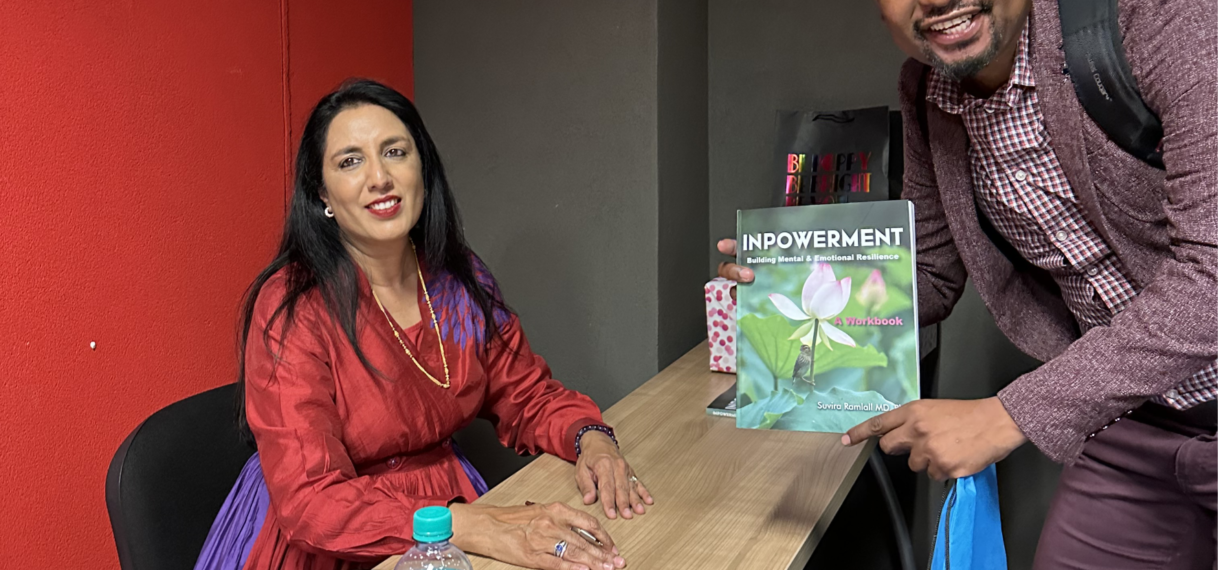Home-New Book Launched on Building ...
The UKZN community, its partners and constituencies are proud of the craftsmanship behind a new book published by Micromega Publishers, Inpowerment: Building mental and emotional resilience, which was authored and launched by the Clinical Head of Specialised Psychiatry at the King Dinuzulu Hospital Complex, Professor Suvira Ramlall.
Applauded for being reader-friendly ‘and practical’ workbook, the workbook that showcases over 30 years of Ramlall’s clinical experience as a psychiatrist to help “INpower” with better mental health resources, advice, tips, and exercises. The book stemmed from a 2021 request for her to create a mental health resource for university staff and students to cope during crises, in the aftermath of the COVID-19 pandemic and the civil unrest which took place in the province.
‘This is written for all people interested in their mental wellbeing and overall health… It is based on scientific evidence but translated into a language and activities doable by all, requiring no resources other than the will to grow resilient,’ said Ramlall. The critical gaps in our training and clinical services have been mental health promotion and mental and emotional literacy. Even within tertiary institutions, the central role that mental wellbeing plays in academic performance and institutional health is not recognised. It was a wonderful challenge to find creative ways to translate abstract and often misunderstood mental and emotional health concepts into practical activities that are within the capabilities of both students and staff…as well as the general public.’
‘Mental health is everybody’s business. People do not realise the interconnectedness between what happens on their “inside” (minds, hearts and souls) and their “outer” lives (productivity, academic performance, physical health, success, relationships, and ultimately, the economy). Many social ills such as violence, crime and substance misuse, have, at their source, underlying mental health issues that are not recognised or addressed. Note that mental health issues are not synonymous with mental illness. The absence of mental illness does not mean that you are necessarily mentally healthy and vice versa.’
Ramlall said: ‘Psychiatry is a much-misunderstood medical discipline; it requires a holistic bio-psycho-social-spiritual-cultural approach to people, health and illness unlike the linear biomedical approach of other medical specialties. There is a huge shortage of mental health professionals in SA, and globally; there will never be enough professionals to meet the mental health needs of communities. It is therefore imperative that individuals and communities invest in their selfcare and improve their mental and emotional literacy and resilience’.
Ramlall explained that psychiatry concerns itself with mental illnesses or disorders. ‘In the clinical arena, psychiatry remains poorly understood by people both within the medical fraternity and the general community. As long as people are uninformed about the recognition of and treatments available for mental disorders, we will continue to see delays in people being diagnosed and treated. Stigma impacts negatively on help-seeking and creates additional challenges for those with lived experience to integrate into society.’
‘I have always been interested in the “inner world” of humans; becoming a doctor and then a psychiatrist were choices that were “made for me” in many serendipitous ways. My interest though, is more in mental wellbeing than mental illness.
The book culminated from UKZN’s Developing Research Innovation, Localisation and Leadership in South Africa (DRILL) programme, which was the result of a competitive grant application to the Fogarty International Centre of the US National Institutes of Health (NIH) awarded to the co-Principal Investigator team in 2015. The project supported research training and induction programmes for early career academics and health professional staff members, under five scientific areas of Human Immunodeficiency Virus/Acquired Immunodeficiency Syndrome (HIV/AIDS), Mental Health, Health Professions’ Education, Health Research Ethics and Health Systems Research.
First launched at the Durban International Book Fair on 9 August, UKZN hosted a launch on 17 August to celebrate the culmination of the DRILL project. Several Fellows who benefited from the DRILL platform shared their experiences of the Personal Development and Success Intelligence workshops that were conducted by Ramlall over a 6 year period. They highlighted the transformative impact the workshops had on both their professional trajectories as well as their personal growth and wellbeing. Through the workshop learnings, they had come to expand their definitions of what true success entailed and had learnt the importance of selfcare.
DRILL’s Communication Principal Investigator, Professor Petra Brysiewicz is a full professor in UKZN’s Discipline of Nursing, School of Nursing & Public Health, from the Discipline of and an honorary full professor UKZN’s the Division of Emergency Medicine in the Department of Surgery at the University of Cape Town, she said the success of the grant was due to so many that have been part of the DRILL family. ‘Not in our wildest dreams did we imagine that it would be as successful as it would be. Thank you to the DRILL Fellows, the Co-PIs and the College of Health Sciences for immense partnerships and support.’
Co-founder of the KZN Mental Health Advocacy Group, Ramlall is passionate about promoting awareness and activities relating to mental wellbeing. She offered the following five tips for generic practice daily to keep an active, health mind, details of which are included in her book:
___________________
Words and photo: Lunga Memela
Caption: Professor Suvira Ramlall
lumela media - Copyright 2022. Designed by Ray's Design Agency
